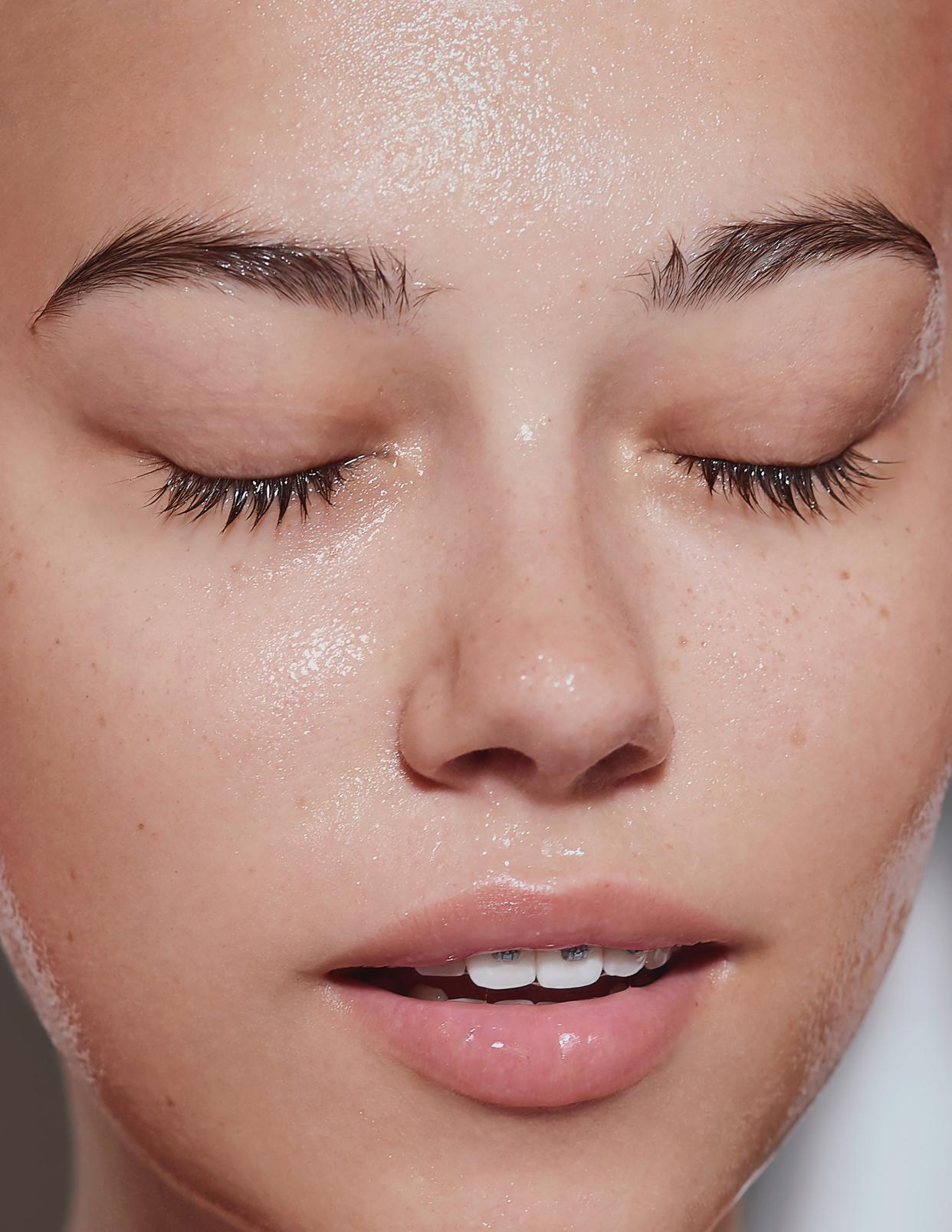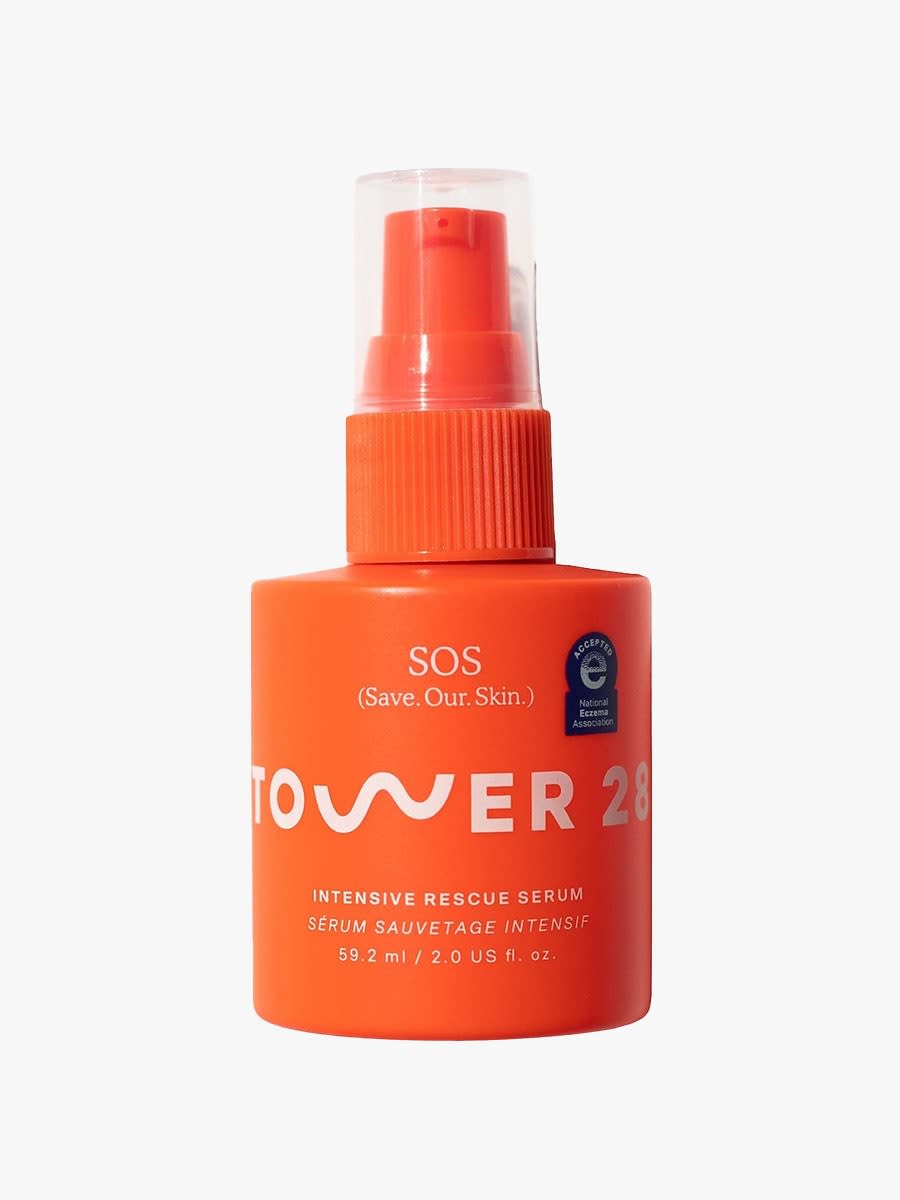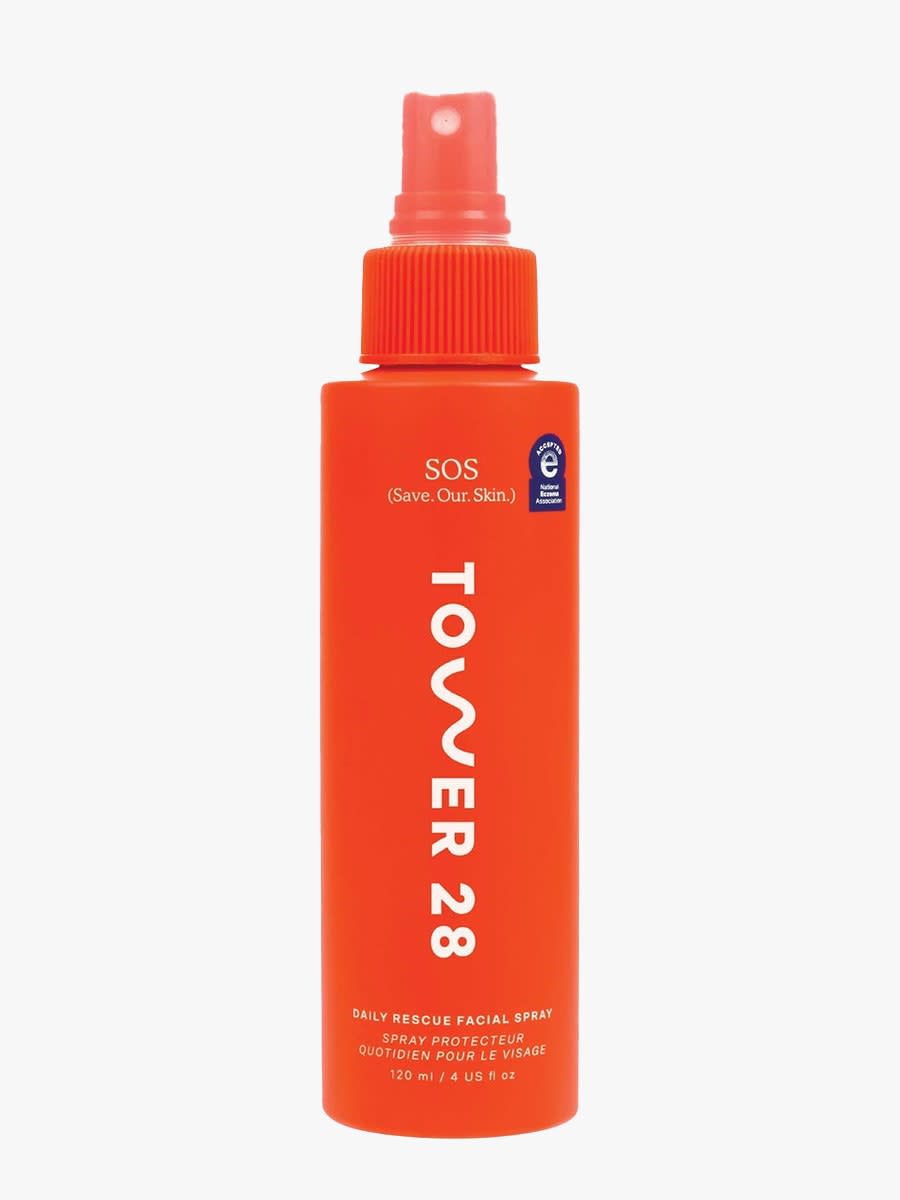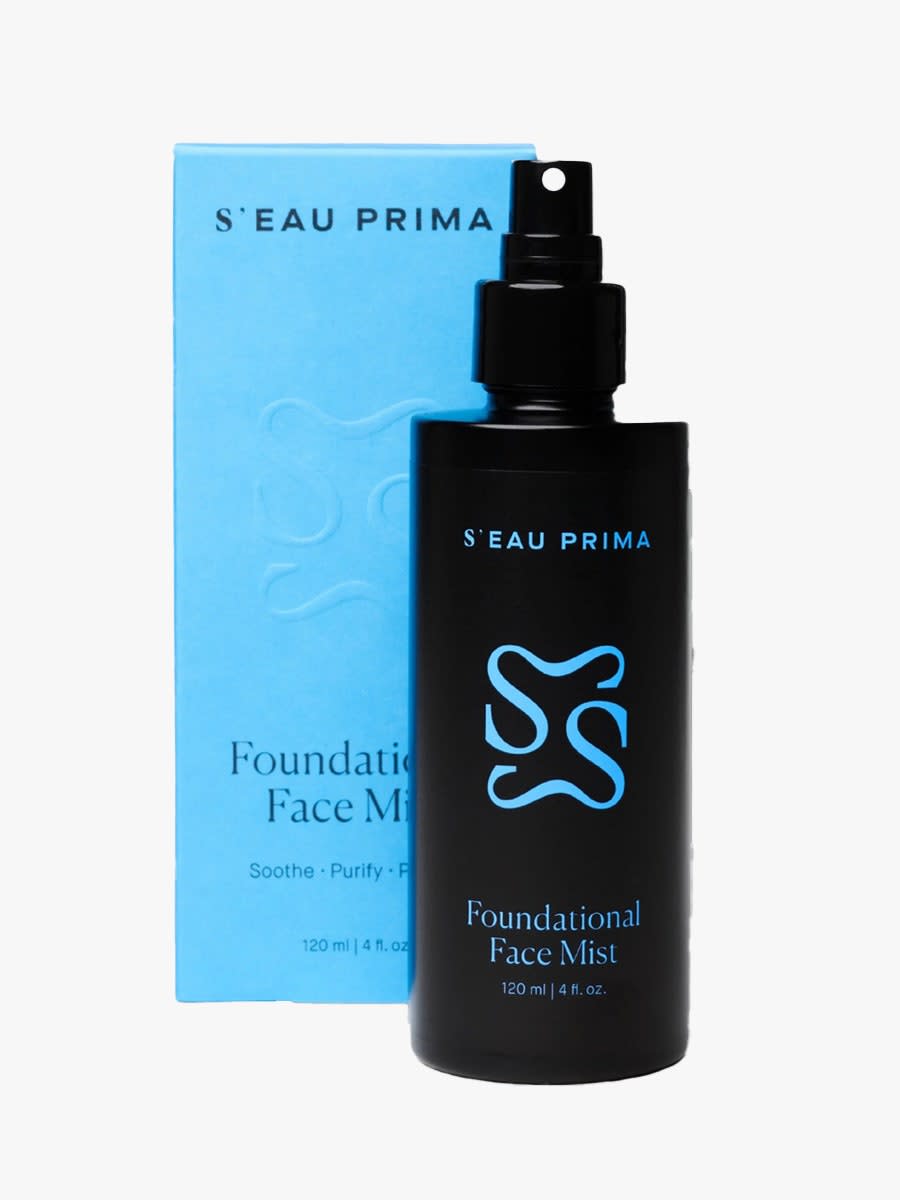Hypochlorous Acid Is Stronger Than Your Average Bleach But Safe for Your Skin

Getty Images
There’s a new gym bag essential sweeping TikTok nation. Creators are now packing spray bottles of hypochlorous acid among their usual Hydroflasks, deodorants, and extra towels. They’re claiming the sprays can help prevent post-workout acne, stave off odor, and even clean equipment—but if it could do all of those things, is it safe to spray on faces? And what even is hypochlorous acid?
First thing’s first: hypochlorous acid is a weak acid (a chemistry term for acid with a low pH level—think citric acid) with strong antimicrobial properties. As in 100-times-more-powerful-than-bleach strong, Jaimie DeRosa, MD, a double-certified plastic surgeon, tells Allure. HOCl (if we're speaking in chemical symbols) is commonly used in surface cleaners, pool cleaners, and facial cleansers. One of these things is not like the others, but you read that right: This disinfectant can also be found in your skin-care products.
Before you go reaching under your kitchen sink for some cleaning supplies to spray on your face…don't. Cosmetic chemist Ginger King says there's a big difference between the hypochlorous acid found in your surface cleaners and the acid found in your face mists. "It has to be diluted to 100 parts per million before it's safe to use on your skin," she says. "Skin-care brands will have diluted the concentration and done safety testing to ensure consumer safety."
When diluted correctly, hypochlorous acid is harsh on harmful bacteria, but gentle on skin–even sensitive skin. Skin experts actually recommend using products with hypochlorous acid to fight common bacterial skin problems like acne, eczema, and psoriasis. It basically disinfects your face, reducing inflammation and speeding up your skin’s natural healing processes.
There's no need to gradually introduce hypochlorous acid into your skin-care routine or worry about adverse reactions–you're already being exposed to it every day. That's because hypochlorous acid is produced naturally by your skin, created by your white blood cells to defend against infection and bacteria. When you get a cut or scrape on your skin, hypochlorous acid kicks in to keep harmful germs out.
Somewhere along the way, chemists discovered how to bottle up HOCl using a simple mixture of salt, water, and vinegar—allowing them to produce hypochlorous acid en masse (and giving us great products like Tower 28's SOS Intensive Rescue Serum).

Tower 28 SOS Intensive Redness Relief Serum
$34.00, Sephora
Now, hypochlorous acid can be found in facial cleansers, serums, creams, and sprays. We spoke to a few skin experts to get the scoop on hypochlorous acid and how to use it. Here's everything you need to know.
Meet the experts:
Ginger King, a cosmetic chemist and product developer based in New Jersey.
Mona Gohara, MD, is a board-certified dermatologist in Hamden, Connecticut.
Jaimie DeRosa, MD, is a plastic and reconstructive surgeon based in Boston and Palm Beach.
In this story:
What is hypochlorous acid?
"Hypochlorous acid is a substance that our bodies naturally produce within our white blood cells, it works to kill bacteria and irritants that are harmful to us," says Dr. DeRosa. In layman's terms, it's nature's disinfectant—used to combat inflammation and speed up the body's natural healing processes.
In the science world, hypochlorous acid is replicated by combining salt, water, and vinegar through electrolysis. The result is a formula that replicates your skin's natural ability to fight bacteria and heal. When that formula is concentrated correctly and added to your favorite skin and hair-care products, you can give your face and scalp a boost of healing energy anytime you need it.
In higher concentrations, hypochlorous acid can be found in common cleaners. It's used to disinfect surfaces, sanitize medical equipment, "and has even been documented to kill coronavirus," says King.
What are the benefits of using hypochlorous acid?
"Hypochlorous acid is a powerful killer of bacteria, viruses, and even fungus," says Dr.DeRosa. Its antibacterial and anti-inflammatory properties make it a great treatment for a variety of skin challenges, from cystic acne to sunburns.
“Hypochlorous acid is a natural antibacterial byproduct of our white blood cells—so it has anti-viral and -bacterial qualities,” says board-certified dermatologist Mona Gohara, MD. She says it can prevent future acne breakouts and can also help reduce signs of past breakouts.
But it gets better. Hypochlorous acid combats redness and inflammation associated with skin conditions like eczema and psoriasis. It calms puffy or angry skin and gently cleanses to prevent future flare-ups. "It's also really good to help reduce itching," says Dr. DeRosa, so you won't be tempted to scratch your skin and spread the infection.
Hypochlorous acid is basically the duct tape of skin care—there's almost nothing it can't fix. It can even help heal a wicked sunburn. Using a hypochlorous acid spray, like Tower 28's SOS Daily Rescue Facial Spray, on your face or scalp can help soothe and repair scorched skin on the spot.

Tower 28 SOS Daily Rescue Facial Spray
$28.00, Sephora
Because hypochlorous acid already lives in your body, products formulated with HOCl are safe for everyday use. You won't develop a resistance to it as you might with a prescription antibiotic, and it won't dry out your skin the way alcohol or benzoyl peroxide would. Some sprays, like S'eau Prima's Foundational Face Mist, can actually help hydrate your skin. This spray contains hypochlorous acid and Bora Bora sea salt. "The sea salt absorbs excess oils and impurities while softening and hydrating the skin," Dr. DeRosa says.

S’eau Prima Foundational Face Mist
$48.00, S'eau Prima
Should I bring hypochlorous acid sprays to the gym?
With all of the above benefits, it makes sense that TikTok creators are now adding hypochlorous acid sprays to their gym bags. “It can help ward off [germs] at the gym that creep onto the skin from communal surfaces,” Dr. Gohara says. She does, however, say that if you have the option, use a surface-sanitizing wipe for your equipment, as they are typically alcohol-based and include other chemicals for deep cleansing.
Hypochlorous acne can also help prevent body acne and odor. “It acts as a shield against millions of microbes we come in contact with when breaking a sweat,” says Dr. Gohara.
So, is it absolutely essential that you keep a bottle with you during your workouts? No—but it can certainly help. “It’s a pretty benign extra layer of defense,” Dr. Gohara says. Her go-to formula is Magic Molecule The Solution. “It’s my favorite because it’s both effective and approved by the National Eczema Society—meaning, it’s good for sensitive skin.”
Are there any risks?
According to our experts, there are virtually no risks to using products with hypochlorous acid to treat any of your skin conditions… as long as those products are formulated correctly and actually intended for your skin.
"By itself, this material can cause chemical burns," says King. "The concentration differs for different applications. In skin care, it has to be diluted to 100 parts per million." She warns that you should never attempt to dilute hypochlorous acid on your own or use products that aren't expressly intended to be used on your skin. "Buy products that are already diluted and include directions for use," she says. "If the product is formulated well, you can use it daily without risk."
Even so, our experts do recommend steering clear of your eyes and mouth when using skin-care products containing HOCl (it is an acid after all).
How do you use hypochlorous acid?
The most common way to add hypochlorous acid to your routine is via a fine-mist spray. Dr. Gohara recommends cleansing your face before gently spritzing one across your entire face. “Then, follow it with a barrier-repair cream,” she says. Senior editor Jesa Marie Calaor loves the Drunk Elephant Bora Barrier Repair Cream, as it deeply moisturizes her extra-dry, often inflamed complexion.
Skin-care products containing hypochlorous acid are totally safe for everyday use. Outside your normal skin-care routine, Dr. DeRosa says these products can be used to spot-treat an acne breakout, soothe a sunburn, or even sanitize your hands in a pinch.
Who should use hypochlorous acid?
Do you have skin? If so, you'll probably benefit from adding some hypochlorous acid to your skin-care routine. Even those with extremely sensitive skin don't have to think twice about using products with hypochlorous acid.
Remember, hypochlorous acid is created by your white blood cells to fight bacteria and infections—so you're already using it every day, in a sense. But your skin might crave an extra spritz of hypochlorous healing power, "especially if you suffer from sensitive skin but need to treat skin conditions like acne or eczema," says Dr. DeRosa.
For those with very sensitive skin, DeRosa recommends looking for hypochlorous acid products that are fragrance-free, like Curative Bay's Advanced Hypochlorous Acid Skin Spray. If you do experience skin irritation from using products with hypochlorous acid, "it's likely due to other ingredients, such as fragrance," she says.
Hypochlorous acid: The TL;DR
Your body makes hypochlorous acid already, but you can't command your white blood cells to target an annoying breakout. That’s where skin-care products containing hypochlorous acid come in. Use these products to give your skin an extra boost of hypochlorous acid to combat common problems like acne and eczema, or use it every day to keep your skin clean, clear, and hydrated.
Read more about skin-care ingredients:
Why Aquaporins Are Making Their Way Into the Skin-Care Conversation
What Is Salicylic Acid and How Exactly Does It Benefit Skin?
Now, watch Sydney Sweeney's 10-minute beauty routine:
Originally Appeared on Allure


